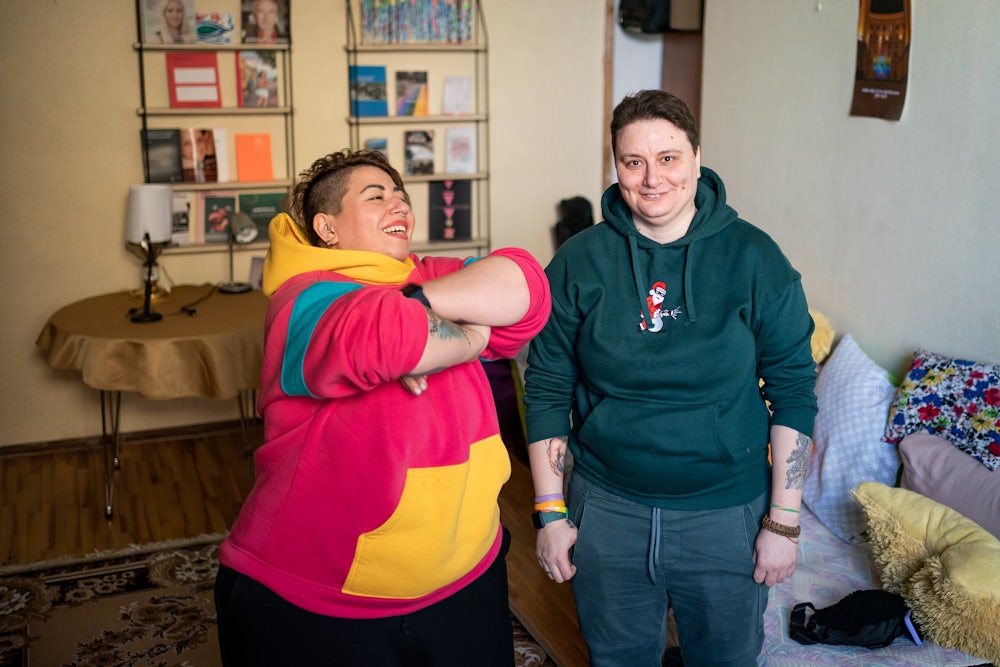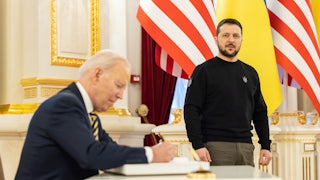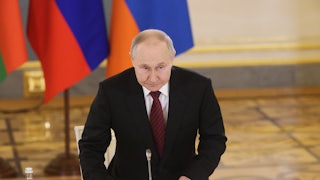On the night of June 3, 2022, the air raid sirens rang in the southern Ukrainian city of Zaporizhzhia and Anastasia Sovenko was huddled in the corridor listening to nearby explosions. The teacher, who is now 25, was with her boyfriend hoping to survive the Russian attack. She scanned the news on her phone and read an article about heterosexual soldiers marrying their partners before going off to war. She told me that she felt “insult, anger, compassion, and hopelessness” all at the same time because same-sex couples could not do the same. Sovenko, who identifies as bisexual, decided to start an online petition to President Volodymyr Zelenskiy to urge him to legalize same-sex marriage. She told me she wanted everyone to “have a chance to get married and protect their families” and especially during wartime, when “each day and minute may be the last one in your life.”
Unexpectedly to her, the petition went viral, clearing the threshold of 25,000 signatures and thus forcing the administration to respond. The Zelenskiy administration said last August it would consider the issue and raised the prospect of “civil partnerships,” but it noted that the country’s constitution defined marriage as based on the “free consent of a woman and a man,” and the constitution couldn’t be changed under wartime martial law.
However, calls for same-sex marriage only grew. On November 1, 33-year-old Kyiv resident Leda Kosmachevskaya announced on Facebook that she was getting married to a man who had been in a same-sex relationship for 15 years because he was going to an especially dangerous part of the front. “Yesterday, somebody proposed to me. I accepted. I’m going to be a soldier’s wife. Not because I love him, but because the president of my country still hasn’t responded to society’s request [to legalize same-sex marriage],” she wrote. That post also went viral. She added that she would take responsibility for identifying him, burying him, and notifying his loved ones—rights that his partner did not have.
In March, lawmaker Inna Sovsun introduced a bill to Parliament to try to give many of those rights to Ukrainian LGBTQ couples. The bill gives same-sex (as well as unmarried opposite-sex) couples the opportunity to register civil partnerships. As LGBTQ people were fighting and dying like other Ukrainians at the front, she thought their partners should be able to make medical decisions or, in the worst but entirely possible case, make funeral arrangements for them. She acknowledged that the constitution couldn’t be changed during wartime to allow same-sex marriage; the bill also doesn’t allow for parental rights, avoiding a showdown on another controversial front.
Like the online petitioner Sovenko, Sovsun said the response to the bill was surprisingly positive. While she expected many colleagues not to go along with it publicly, she has 18 members of Parliament out of 450 as co-sponsors. She still thinks that she doesn’t have the votes for it to pass—complicated by the fact that she is a member of a minority party, Holos (“Voice”), and not in Zelenskiy’s parliamentary majority, which sets the agenda. (She noted that she has 11 co-sponsors from his Servant of the People party.) But she was going to “do [her] best.”
The Ministry of Defense opposes her bill. In a public written response, it noted that it had no data about the number of same-sex couples serving in the military and repeated that the constitution could not be changed. Sovsun dismissed the statement, speculating that a “homophobic bureaucrat” had put it at Defense Minister Oleksii Reznikov’s desk as one of hundreds of papers to sign. She is hopeful that the ministry will come around; she notes that the Defense Ministry is, perhaps unsurprisingly, “busy” with other matters and that Zelenskiy himself is silent on the bill. (The presidential administration didn’t immediately return a request for comment.)
Meanwhile, Ukrainians are growing more tolerant. In a 2016 poll conducted by the Ukrainian LGBTQ organization “Nash Svit” and the Kyiv International Institute of Sociology, 60 percent of Ukrainians had negative attitudes toward LGBTQ people. In 2022, the number was down to 38 percent. In the 2022 poll, almost 64 percent believed that LGBTQ people should have equal rights; even 42 percent who viewed LGBTQ people negatively were for equal rights. The war is making LGBTQ soldiers more visible in Ukraine; social media has played a big role. An NGO called “LGBTIQ Military”—with a big Instagram presence—says that it has over 300 members.
The war was making Dmytro, 24, and Mykola, 32, more visible. They were photographed as a couple for a recent KyivPride event supporting the civil partnerships bill. Mykola was back from a deployment in Eastern Ukraine, while Dmytro had served in the army and was now a volunteer for the military in Odesa. Mykola had lost an ex-boyfriend in the war; he and Dmytro had been together for about a year. Mykola told me that he wasn’t open with his unit about his orientation because of its “far-right” politics. Still, soldiers didn’t think about sexuality often “because they don’t have time for thinking.” He added, “It’s very important you can trust a person who is near you, but not about whether they are gay or straight; it’s important what their values and character are.”
In his speech announcing the full-scale invasion, Russian leader Vladimir Putin justified the war by saying the West sought to destroy Russia’s “traditional values.” Sovsun and other gay rights campaigners hope that tying opposition to LGBTQ rights with Putin’s homophobia will help change attitudes in Ukraine, out of a desire to be seen as European and not Russian. “There are people who say they are OK with the bill just because Putin is homophobic,” she said. However, Mykola said that while that connection sometimes changed attitudes, “we don’t want to connect anything Ukrainian with Russia, even homophobia or bad values. It’s our homophobia and our bad values, not Russia’s.”
Despite opposition and even threats—one openly gay soldier recently said that unidentified people had threatened to burn down his mother’s house while he was at the front—Ukrainian society does appear to be changing rapidly in favor of LGBTQ rights during the war because many soldiers are increasingly open. “Right now, you cannot say no to anyone wearing a uniform and carrying a gun to protect you,” Sovsun said. To even “the most homophobic” members of Parliament, she had said: “OK, you don’t like gays? Will you go and say that to the guys who are now near Donetsk protecting us? Because there is a lovely gay couple who is fighting [there] right now, but they cannot make their relationship official.”






